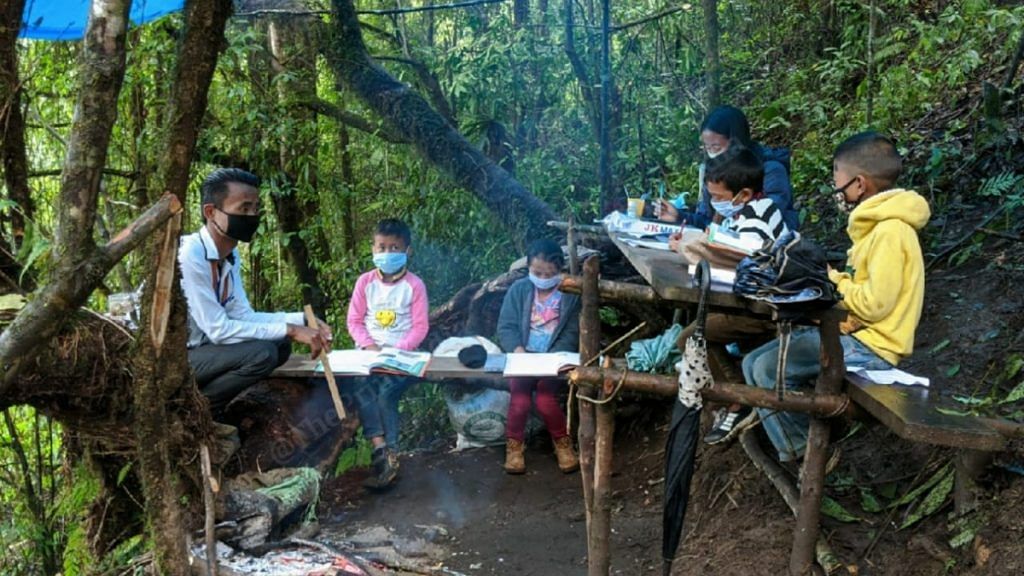New Delhi: The military junta in Myanmar has stopped the services of mobile internet providers such as Telenor in the country’s Chin state, which borders Mizoram. And this has had an unlikely effect on students in Mizoram’s Chapi village.
Residents of Chapi, considered the closest village to the India-Myanmar border, were dependent on the services of Telenor, a communications firm, which provided internet and mobile services in Myanmar. But with internet services being stalled in the neighbouring country, students of Chapi were left with no internet to continue their online classes.
Many of them have now joined students in the nearby Mawhre village for their online lessons, reported the Northeast Today. But Airtel, which is the sole internet service provider in Mawhre, does not supply enough bandwidth for the students to pursue online classes. Hence, some of them from Mawhre have constructed makeshift structures atop a mountain top nearby to access better signal from a vantage point.
State government authorities had recently visited these makeshift structures and assured help to the students.
Also read: ‘God’s gift’ Hathei chillis and Tamenglong oranges of Manipur get GI tag
Judima rice wine is Northeast’s first traditional brew to get GI tag
Judima, a fermented drink made from rice by the Dimasa tribe of Assam, was granted the GI tag earlier this week. It is the first traditional brew from the Northeast to bag a GI tag.
The wine is made from three varieties of rice — a glutinous sticky variety, an everyday non-sticky variety and the bairing rice. Bairing rice is cultivated in the Jhum style only by the Dimasa people for preparing Judima.
The Dimasas have Judima on occasions marking births or deaths and other traditional ceremonies.
“It is prepared in the same method as all rice wines in the Northeast like xaaj, apong, chhang etc and requires a starter kit (a white dry disc-shaped cake, slightly bigger than a lemon). What makes it unique is the use of a wild herb named thembra, and the rice combination along with bairing. Bairing is not a fine variety of rice. So it is not consumed as food,” Uttam Bathari, managing trustee of Youth Association for Development and Empowerment, who initiated the GI proposal in 2018, told The Hindu.
Only BBA from her village, Mizoram woman’s firm selling ‘jungle red tea’ supports 300 farmers
Lalthamuani, a 22-year-old entrepreneur from Mizoram’s Leisenzo village, is the first ever person from her little hamlet to obtain a BBA degree and she is already supporting over 300 farmers.
Lalthamuani, who braved poverty and gender stereotyping, had supported her education by founding a small enterprise called Eco Far in 2018 that sold sustainable utility products like recycled and decorated bottles, and took up a few marketing jobs.
But things changed early this year. With fewer job opportunities amid the pandemic, farmers, who produced tea only for consumption, turned to Lalthamuani – the only person with a formal business education in the village – to help them market their tea products, reported YourStory.
It was then that she decided to venture into the tea business with Eco Far.
“My grandmother often told me that the jungle tea grown here is unique and one ought to become successful making a business out of it with the right skill set,” she has been quoted as saying.
Eco Far’s flagship product today is the ‘jungle red tea’.
Meghalaya scientists discover first cicada species in Nagaland
A team led by scientists from the North Eastern Hill University (NEHU) in Shillong have discovered the first cicada species in Nagaland. The new species has been named Platylomia kohimaensis, the first ‘indigenous’ one to be found in Nagaland.
Findings of the study, authored by S.R. Hajong and Limatemjen, were published in the journal Zootaxa. Hajong is an associate professor and an entomologist in NEHU’s Department of Zoology.
“The study was part of a project funded by the Centre’s Department of Biotechnology under which 70 cicada species from the Northeast were inventoried,” Hajong was quoted as saying by news agency PTI.
Cicadas have an exceptionally loud song, produced by the rapid buckling and unbuckling of its drumlike tymbals.
Also read: This Nagaland village council has decided to not pay ‘taxes’ till underground groups unite
